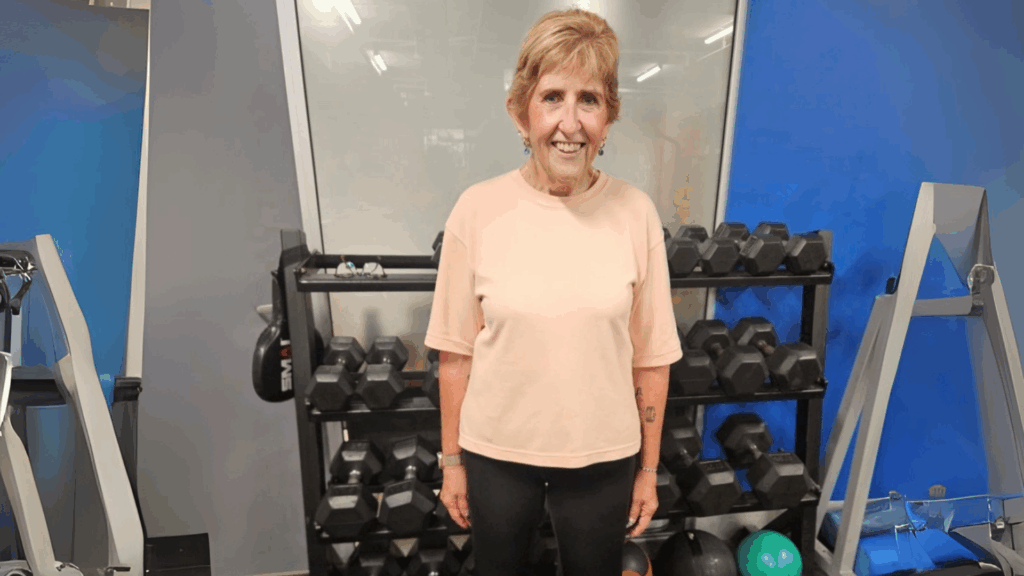
Many individuals diagnosed with cancer often question whether they can safely engage in physical activity during treatment. Contrary to some beliefs, exercise is not only possible for most but can also significantly aid in managing the emotional and physical challenges of cancer therapy. Michelle’s story exemplifies this potential, showcasing her remarkable journey from diagnosis to becoming a dedicated fitness enthusiast.
Michelle’s life took an unexpected turn when she was diagnosed with chronic lymphocytic leukemia (CLL) in 2019, followed by stage 3 colon cancer in 2021. Her story is one of resilience and determination, transforming a life-altering diagnosis into a powerful motivator for change.
A Life-Changing Diagnosis Becomes a Catalyst
A cancer diagnosis can evoke a wide array of emotions. For Michelle, the news ignited an unexpected sense of determination. At 60, she was already contending with severe mobility issues due to osteoarthritis and was on the brink of needing a knee replacement when she received her first cancer diagnosis. This pivotal moment became the catalyst for Michelle to take control of her health.
Determined to improve her well-being, Michelle set out to lose weight, regain mobility, and build strength while undergoing cancer treatment. She joined Vision Personal Training Wynyard, where her trainer, Adam, tailored a fitness plan to accommodate her treatment schedule and health needs. Initially, Michelle struggled to lift a 2kg dumbbell, but her perseverance led to significant improvements, including reduced knee pain and increased stamina.
Training Through Chemotherapy and Lockdowns
Michelle’s journey took another challenging turn when she was diagnosed with stage 3 colon cancer in 2021, just two years after her initial diagnosis. This new battle involved four rounds of chemotherapy and surgery to remove a portion of her bowel. Compounding the difficulty was the isolation brought on by Sydney’s COVID-19 lockdowns, which kept her family at a distance.
To combat fear and maintain her fitness goals, Michelle embraced walking as a daily ritual. “I walked every day to keep busy. Sydney CBD was my LGA, so I would pack a lunch and walk all day,” she recalls. As soon as she was physically able, she returned to the gym, finding solace and strength in her routine. Michelle also used social media to keep her loved ones updated and found empowerment in participating in a Cancer Council NSW fundraising challenge.
“Even if you think the gym is not for you, go for a walk. Even if you’re feeling nausea or fatigue from cancer treatment, go for a walk and it can make a world of difference.” — Michelle
Living Well and Staying Strong at 64
Today, Michelle’s cancer treatment has been successful. Her colon cancer is gone, and her CLL is in remission. At 64, she is not only surviving but thriving. Michelle can now bench press 30kg and deadlift 80kg, having lost 45kg in the process. She is also pursuing a Certificate III in Fitness at TAFE, driven by her passion for exercise.
Michelle’s story is a testament to the power of resilience and the benefits of physical activity during cancer treatment. Her journey underscores the importance of staying active, even when facing significant health challenges. “Cancer has made me appreciate things a little bit better. I try not to sweat the small stuff as much anymore, looking after my health is top priority,” she reflects.
The Broader Implications of Exercise During Cancer Treatment
Michelle’s experience aligns with growing research suggesting that exercise can be a beneficial adjunct to cancer treatment. According to the American Cancer Society, regular physical activity can help reduce fatigue, improve physical function, and enhance quality of life for cancer patients. Furthermore, studies have shown that exercise may even improve treatment outcomes and reduce the risk of cancer recurrence.
Experts advocate for personalized exercise programs tailored to individual capabilities and treatment plans. Dr. Jane Smith, an oncologist specializing in integrative medicine, emphasizes the importance of consulting healthcare providers before starting any exercise regimen. “Exercise should be seen as a complementary therapy that can support traditional cancer treatments,” she advises.
As more cancer patients like Michelle share their stories, the narrative surrounding exercise and cancer treatment continues to evolve. Her journey not only inspires others facing similar battles but also highlights the potential for exercise to play a crucial role in cancer care.
Looking ahead, Michelle remains committed to her fitness journey and encourages others to find their own paths to wellness. Her story serves as a powerful reminder that even in the face of adversity, the human spirit can triumph through determination and resilience.






